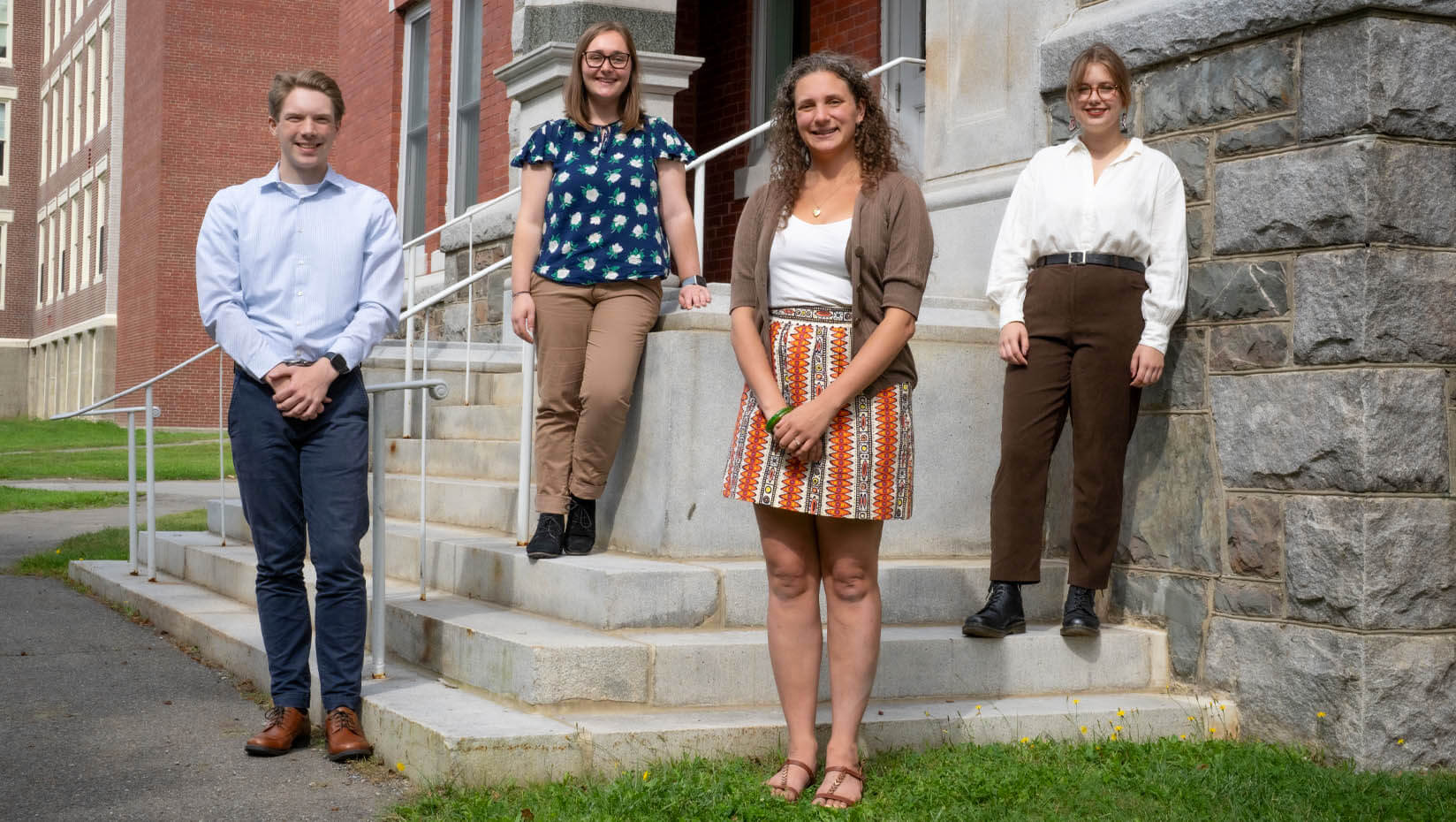
McGillicuddy Humanities Center welcomes fall 2023 undergraduate fellows
This semester, the Clement and Linda McGillicuddy Humanities Center (MHC) welcomes four new undergraduate research fellows: Chapman “Chappy” Hall, Iris Loehr, Sarah Renee Ozlanski and Katherine Ritche. This new cohort will join current fellows Paige Allen, Sebastien Chamberlain, Abigail Roberts and Willow Wind.
MHC undergraduate fellows receive an award of up to $8,000 over the course of two semesters to pursue an independent research or creative project in the humanities in collaboration with a faculty member.
Hall is a history major in the Honors College from Brunswick, Maine. His MHC project, titled “Playing History: What Video Games Teach Us About the Past” will be completed under the supervision of professor of history Liam Riordan. Hall will survey gamers to understand how historically themed video games teach history as an active experience. Focussing on the video game “Europa Universalis IV” and themes of colonialism and imperialism in the 18th century, Hall will research the relationship between history and the video games industry, the nature of video games as a medium and the potential video games possess to create an understanding of history through experience.
Loehr is an English major in the Honors College from Cincinnati, Ohio. Her project is titled “Mountain People: Essays on Place and Personhood in Appalachia.” Loehr will work with faculty mentor James Brophy of the Honors College on a collection of essays on a variety of topics pertaining to central Appalachia and place. By blending creative and academic styles, Loehr aims to explore human interaction with the region’s geography and geology to develop a narrative of Appalachian identity that runs counter to the ones driven by stigma. In the popular imagination, Appalachia is a site of poverty, incest and strife. Online characterizations of Appalachia portray it as a place filled with cannibals, killers, and spirits that haunt the woods deep in the mountains. Loehr’s project challenges the stigmas drawn from the region’s systemic poverty and historical isolation by presenting a vision of Appalachian culture that’s vibrant, nuanced and inherently bound to the mountains from which it emerged.
Ozlanski is a studio art and English double major from Belfast, Maine. Working with associate professor of English Carla Billitteri, Ozlanski’s project is called “The Language of my Grandmother is a Language of Resistance: How the Matrilineal Transmission of Pisanki Express Cultural Identity.” Ozlanski, the Echoes of Maine Fellow, will be expanding on research into the matrilineal tradition of pisanki, which forms a part of her cultural heritage. Pisanki are colorful eggs with images written on them through a wax and dye resistance process. These eggs can be read by those who understand the combination of colors and symbols. Ozlanski is exploring the ways this tradition has been preserved for over a thousand years by being passed down from mothers to daughters. She will also examine how pisanki has become a symbol of cultural identity for people of Ukrainian and Polish heritage, an object of cultural memory and a symbol of resistance for Ukraine during Russia’s invasion. In addition to examining a variety of scholarly investigations into this topic, Ozlanski will also be doing her own creative research about pisanki as a kind of written language that is gender and culturally specific. Her examination of this cultural expression will explore how this language represents an intersection between art and writing that can communicate the values, perspectives and histories of Ukrainian and Polish women.
Ritchie, a history and secondary education double major from Northport, Maine is working with professor of History Anne Knowles to pursue a project titled “Mapping Education: Using Maps to Teach the Holocaust.” Ritchie, the Sandra Merrill Peters and John G. Peters Fellow, will utilize mapping and teaching methods to make Holocaust education more accessible and dynamic for high school and college-aged students. Ritchie will be using a geographic information system (GIS) to create maps and lesson plans for fellow teachers and students with the goal of making the topic more approachable. Her work also looks to bridge the gap between high school classrooms and academic studies of the Holocaust with the use of interactive maps and lesson plans that are educational for both students and teachers at the secondary and collegiate levels.
In addition to honing their research skills and building their academic networks, MHC fellows serve as humanities ambassadors to their peers, the campus and the broader community. For students interested in becoming a fellow, and faculty who might like to nominate one, the next deadline to apply for a fellowship is Oct. 17. Research and creative work of all types across the humanities will be considered. This includes academic papers, art gallery shows, community workshops or films. Applicants do not need to be humanities majors or minors to be eligible. More information, including application instructions, proposal guidelines and a statement of purpose, is available on the MHC website.
The MHC supports excellent teaching, research and public engagement in the humanities to deepen understanding of the human condition. It supports programs that foster intellectual curiosity, critical reflection and creative innovation. At the core of the center’s work is the belief that studying the humanities inspires compassion across differences, develops empathy, strengthens critical thinking skills and cultivates the emotional and intellectual agility needed to navigate an increasingly interconnected and complex global landscape.
Contact: Brian Jansen, brian.jansen@maine.edu
